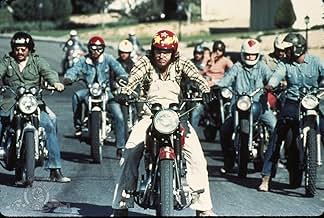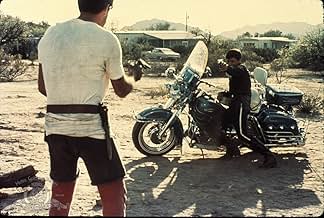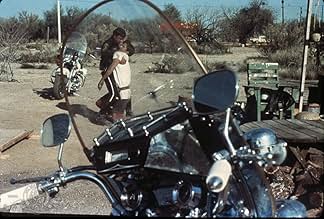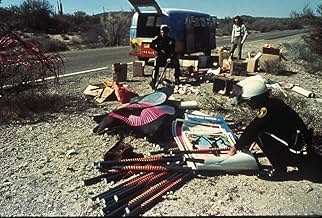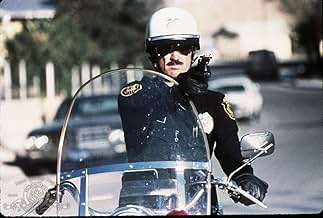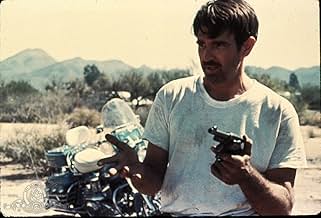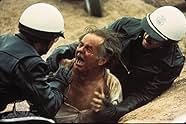IMDb RATING
7.0/10
6.9K
YOUR RATING
A motorcycle cop with a Harley-Davidson ties hippies to a murder in the Arizona desert.A motorcycle cop with a Harley-Davidson ties hippies to a murder in the Arizona desert.A motorcycle cop with a Harley-Davidson ties hippies to a murder in the Arizona desert.
- Awards
- 3 nominations total
Billy Green Bush
- Zipper
- (as Billy 'Green' Bush)
Elisha Cook Jr.
- Willie
- (as Elisha Cook)
Hawk Wolinski
- VW Bus Driver
- (as David J. Wolinski)
Melissa Greene
- Zemko's Girlfriend
- (as Melissa Green)
Featured reviews
Robert Blake has one of the best roles of his career as John Wintergreen, a dedicated motorcycle cop who yearns for more in life. What he'd really like is to be a detective - to wear a suit, a Stetson, and "get paid to think". He gets his chance when he discovers what first appears to be a suicide, but which John determines had to have been a murder. When John shows that he's got what it takes for the detective business, a charismatic hotshot named Harve Poole (Mitch Ryan) takes him under his wing, hiring John as a driver. What happens is that John becomes quite disillusioned watching Harve at work. John strives to be a good, kind, honest man, and doesn't like Harves' approach to law enforcement. A revelation regarding his colleague and good friend "Zipper" (Billy Green Bush) only adds to his dismay.
"Electra Glide in Blue" marked the filmmaking debut for James William Guercio, a veteran of the music industry who, with the help of ace cinematographer Conrad Hall, brings a lot of visual poetry which is not the action-packed murder mystery that some viewers might expect, or hope, it to be. That aspect of this film is never heavily stressed, as the movie clearly functions much more as a series of character vignettes. It's got a very deliberate pace to it, as it gives a number of its major players opportunities to tear into some meaty roles. Blake and Bush have fine chemistry and are quite engaging; you believe them as buddies. Ryan commands the screen whenever he's around; he's an excellent character actor (whom you may know best as the villain in "Lethal Weapon") who gives his role some real nuance. Royal Dano is a little under utilized as a grumpy coroner with whom John butts heads, but Jeannine Riley is wonderful as the barmaid Jolene, and Elisha Cook Jr. is as delightful as ever in the role of sad old sack Willie. Considering Guercios' background, it's not a surprise that some of the supporting players come from the music business - screenwriter Hawk Wolinski as the van driving hippie, and Peter Cetera and Terry Kath from the band Chicago; Cetera, amusingly, plays a scruffy biker. Keep a sharp eye out for Nick Nolte, uncredited as an extra in the commune scene.
The film turns out to be a moving meditation on personal ideals and loneliness, and leads to a shattering conclusion. This conclusion is much in line with films of this time period, and takes its time to play out. It's the kind of thing you don't easily forget.
It's not hard to see why this would have a following. It's interesting and it's entertaining, and well worth a look.
Seven out of 10.
"Electra Glide in Blue" marked the filmmaking debut for James William Guercio, a veteran of the music industry who, with the help of ace cinematographer Conrad Hall, brings a lot of visual poetry which is not the action-packed murder mystery that some viewers might expect, or hope, it to be. That aspect of this film is never heavily stressed, as the movie clearly functions much more as a series of character vignettes. It's got a very deliberate pace to it, as it gives a number of its major players opportunities to tear into some meaty roles. Blake and Bush have fine chemistry and are quite engaging; you believe them as buddies. Ryan commands the screen whenever he's around; he's an excellent character actor (whom you may know best as the villain in "Lethal Weapon") who gives his role some real nuance. Royal Dano is a little under utilized as a grumpy coroner with whom John butts heads, but Jeannine Riley is wonderful as the barmaid Jolene, and Elisha Cook Jr. is as delightful as ever in the role of sad old sack Willie. Considering Guercios' background, it's not a surprise that some of the supporting players come from the music business - screenwriter Hawk Wolinski as the van driving hippie, and Peter Cetera and Terry Kath from the band Chicago; Cetera, amusingly, plays a scruffy biker. Keep a sharp eye out for Nick Nolte, uncredited as an extra in the commune scene.
The film turns out to be a moving meditation on personal ideals and loneliness, and leads to a shattering conclusion. This conclusion is much in line with films of this time period, and takes its time to play out. It's the kind of thing you don't easily forget.
It's not hard to see why this would have a following. It's interesting and it's entertaining, and well worth a look.
Seven out of 10.
An incredible piece of film making, this beautifully shot movie really is about as poetic as it's possible for cinema to be and still have a coherent, gripping narrative. It feels like a western with its dramatic monument valley backdrop and masculine themes, but plays more like a European movie, with it's dark characterisations and existential mood . The soundtrack is fantastic and the feeling the movie imparts is unique. I always recommend this film to people because so few have ever seen it. I think it's a tragedy that James Guercio didn't make more movies because this was his first (and only) film and it's up there with the best of Peckinpah/Leone/Boorman/Seigal (whose work is similar). I'll never forget this film and the ending will live with me forever. If you like movies you need to see this film, This is real Cinema.
American music producer James William Guercio's one-off dalliance with filmmaking, ELECTRA GLIDE IN BLUE is made when he is only 28-year-old. It stars Robert Blake as a motorcycle cop Johnny Wintergreen who patrols rural Arizona highways and aspires to be a homicidal officer.
The movie opens with a promising panache hardly betrays that Guercio is a greenhorn, conjecturing through its voyeuristic close-ups, audience would soon realize a face-unshown man prepares to kill himself, yet, Guercio's camera also cunningly suggests that he is cooking beef streaks at the same time. Then, boom! He blows himself dead through a shotgun, which unusually aims to his chest rather than the usual easy target, the head, it compellingly sets a paradoxical situation that one immediately knows there is something fishy about the whole act.
Also, before the title card, Guercio takes a tongue-in-cheek tack to introduce our unlikely hero, big Johnny, the camera lurks and swirls in the apartment where Johnny expertly gratifies Jolene (Riley) in bed, before revealing that Johnny is small in stature. When a man's masculinity is stunted by his appearances, it gives audience an idea why he is so eager to achieve something, to compensate the ingrained inferiority complex is a shoo-in. So the apparent-suicidal case becomes his stepping stone to be recruited by detective Harve Poole (Ryan) for his astute observation that it is indeed a murder underneath the hatched facade.
But the ensuing police procedural dampens Johnny's driving enthusiasm, especially after witnessing Harve hectors physically abuses and a group of hippies to milk information about their prime suspect, a drug dealer Bob Zembo (a cameo of Peter Cetera, one of the four CHICAGO members who take on acting roles here apart from their contribution to the picture's soundtrack), and the final straw is an awkward confrontation between him, Harve and Jolene, the latter turns out to be Harve's lover, and spitefully lambastes Harve's incompetence to make her contented and laments her ill-fated destiny, working in a barrelhouse after a dashed Hollywood dream, Johnny and Harv fall out afterwards.
Unambiguously Guercio conducts a half-hearted approach to solve the murder mystery, after trifling with a biker-chasing set piece to keep the action moving, the movie falls back on Johnny's "inner voice" for an expedient epiphany to realize who is the murderer at the end of a MADURA concert, with reasons unexplained, but that is not enough, ultimately there would be another revelation later, to further muddle the water and leave the opening scene ever so ambivalent when one retraces back, before reaching its chilling coda, completely hits viewers like a cold shower, willful but symbolic, overall, it is a loner's world against the canvas of a vast Arizona landscape, everyone in the story is either indolent, disillusioned or corrupt, only the hippies' community stands in as a getaway from the unpleasant reality, but their guarded world is defiant towards the mainstream values, Johnny represents a tragic hero who is doomed because of what he represents, an authority figure, cannot be saved by his amiable personality and all-too-well intentions.
Performance-wise, everyone on board is on a par with excellence, Elisha Cook Jr. is heart-rending to watch in his committed lunacy, Mitchell Ryan expertly imbues a certain degree of passing diffidence in his bombast mannerism and Billy Green Bush is so organic as Johnny's shade- hogging partner and nails his big scene with a flourish, so is Jeannine Riley, manages to steal some limelight even with a role riddled with platitudes. And our leading man Robert Blake, ever so self- reliant as a pipsqueak trying rather hard to chase his dream, only to get short-changed by a cynical world.
ELECTRA GLIDE IN BLUE, also bolstered by a symphonic soundtrack produced by Guercio himself and its striking wide-screen landscape sensation shot by DP Conrad L. Hall, is an astonishing debut feature, if it intends to be more of a zeitgeist-capturer than a gripping detective story, then I must give my whole-hearted congratulations to the crew, mission grandly accomplished!
The movie opens with a promising panache hardly betrays that Guercio is a greenhorn, conjecturing through its voyeuristic close-ups, audience would soon realize a face-unshown man prepares to kill himself, yet, Guercio's camera also cunningly suggests that he is cooking beef streaks at the same time. Then, boom! He blows himself dead through a shotgun, which unusually aims to his chest rather than the usual easy target, the head, it compellingly sets a paradoxical situation that one immediately knows there is something fishy about the whole act.
Also, before the title card, Guercio takes a tongue-in-cheek tack to introduce our unlikely hero, big Johnny, the camera lurks and swirls in the apartment where Johnny expertly gratifies Jolene (Riley) in bed, before revealing that Johnny is small in stature. When a man's masculinity is stunted by his appearances, it gives audience an idea why he is so eager to achieve something, to compensate the ingrained inferiority complex is a shoo-in. So the apparent-suicidal case becomes his stepping stone to be recruited by detective Harve Poole (Ryan) for his astute observation that it is indeed a murder underneath the hatched facade.
But the ensuing police procedural dampens Johnny's driving enthusiasm, especially after witnessing Harve hectors physically abuses and a group of hippies to milk information about their prime suspect, a drug dealer Bob Zembo (a cameo of Peter Cetera, one of the four CHICAGO members who take on acting roles here apart from their contribution to the picture's soundtrack), and the final straw is an awkward confrontation between him, Harve and Jolene, the latter turns out to be Harve's lover, and spitefully lambastes Harve's incompetence to make her contented and laments her ill-fated destiny, working in a barrelhouse after a dashed Hollywood dream, Johnny and Harv fall out afterwards.
Unambiguously Guercio conducts a half-hearted approach to solve the murder mystery, after trifling with a biker-chasing set piece to keep the action moving, the movie falls back on Johnny's "inner voice" for an expedient epiphany to realize who is the murderer at the end of a MADURA concert, with reasons unexplained, but that is not enough, ultimately there would be another revelation later, to further muddle the water and leave the opening scene ever so ambivalent when one retraces back, before reaching its chilling coda, completely hits viewers like a cold shower, willful but symbolic, overall, it is a loner's world against the canvas of a vast Arizona landscape, everyone in the story is either indolent, disillusioned or corrupt, only the hippies' community stands in as a getaway from the unpleasant reality, but their guarded world is defiant towards the mainstream values, Johnny represents a tragic hero who is doomed because of what he represents, an authority figure, cannot be saved by his amiable personality and all-too-well intentions.
Performance-wise, everyone on board is on a par with excellence, Elisha Cook Jr. is heart-rending to watch in his committed lunacy, Mitchell Ryan expertly imbues a certain degree of passing diffidence in his bombast mannerism and Billy Green Bush is so organic as Johnny's shade- hogging partner and nails his big scene with a flourish, so is Jeannine Riley, manages to steal some limelight even with a role riddled with platitudes. And our leading man Robert Blake, ever so self- reliant as a pipsqueak trying rather hard to chase his dream, only to get short-changed by a cynical world.
ELECTRA GLIDE IN BLUE, also bolstered by a symphonic soundtrack produced by Guercio himself and its striking wide-screen landscape sensation shot by DP Conrad L. Hall, is an astonishing debut feature, if it intends to be more of a zeitgeist-capturer than a gripping detective story, then I must give my whole-hearted congratulations to the crew, mission grandly accomplished!
With those evocative images and that emotionally charged music, the final fifteen minutes are electrifying. It's all about America, and a terrible ten years of assassinations, Viet Nam, and countless other cultural strife. The film's ending is saying ... enough is enough. Let the healing begin. And as American culture bled in the late 1960s and early 1970s, so too did the emotional lives of individuals, like the hodgepodge of aggrieved characters that come and go in this story.
Seeing some of these people and listening to their individual stories of pain and suffering is John Wintergreen (Robert Blake), a by-the-book Arizona motorcycle cop, short on stature but tall on dreams. Sometimes with his partner Zipper (Billy Green Bush), "Big John" encounters these tormented souls, on the road mostly. That's his job. The film's story is an ode to the courage and nobility of ordinary Americans pained by reality with only their dreams to comfort them.
The film's disjointed plot begins with a killing. And this incident keeps the plot moving. But "Electra Glide In Blue" is mostly a character study, not a crime film. Color cinematography is quite good. Interior shots have lots of close-ups, even extreme close-ups. There's a lot of diffuse lighting. Exteriors are shot like a modern-day Western. Indeed, the look and feel of the film is similar in some ways to the old John Ford Westerns, like "The Searchers".
The plot is the main weakness of the film. Some parts are overplayed, like the chase scenes. There's a lack of continuity both in storyline and in visual elements. It's as if many scenes were shot impromptu, on the rush. And some of the acting is way over the top. However, Robert Blake does a fine job as America's everyday cop with his sense of principles.
This film reminds me in some ways of "Zabriskie Point" (1970), a counter culture film which has a powerful ending that helps to make up for earlier plot problems.
Based on a real-life event, "Electra Glide In Blue" gets off to a slow start. Even midway through, one wonders whether this film is going anywhere or has any point to it. It is, and it does. You just have to wait for that powerful ending and its cinematic message of a tormented America, from the point of view of one lonely cop, just doing his job.
Seeing some of these people and listening to their individual stories of pain and suffering is John Wintergreen (Robert Blake), a by-the-book Arizona motorcycle cop, short on stature but tall on dreams. Sometimes with his partner Zipper (Billy Green Bush), "Big John" encounters these tormented souls, on the road mostly. That's his job. The film's story is an ode to the courage and nobility of ordinary Americans pained by reality with only their dreams to comfort them.
The film's disjointed plot begins with a killing. And this incident keeps the plot moving. But "Electra Glide In Blue" is mostly a character study, not a crime film. Color cinematography is quite good. Interior shots have lots of close-ups, even extreme close-ups. There's a lot of diffuse lighting. Exteriors are shot like a modern-day Western. Indeed, the look and feel of the film is similar in some ways to the old John Ford Westerns, like "The Searchers".
The plot is the main weakness of the film. Some parts are overplayed, like the chase scenes. There's a lack of continuity both in storyline and in visual elements. It's as if many scenes were shot impromptu, on the rush. And some of the acting is way over the top. However, Robert Blake does a fine job as America's everyday cop with his sense of principles.
This film reminds me in some ways of "Zabriskie Point" (1970), a counter culture film which has a powerful ending that helps to make up for earlier plot problems.
Based on a real-life event, "Electra Glide In Blue" gets off to a slow start. Even midway through, one wonders whether this film is going anywhere or has any point to it. It is, and it does. You just have to wait for that powerful ending and its cinematic message of a tormented America, from the point of view of one lonely cop, just doing his job.
Before he found himself on the wrong side of a murder investigation, Blake was noted for playing an unconventional cop on the TV show "Baretta" (and also the flip side as a brutal killer in the film "In Cold Blood".) Here he is a square peg trying to fit into a round hole as a California Highway Patrolman with dreams of more. At 5'4", he is a full head shorter than the shortest of his fellow motorcycle-riding fellow officers. Though his cohort Bush balances his days between sitting on his bike reading comic books and listening to the radio with pulling over anyone even remotely suspicious, Blake yearns to be a better cop than that and, ultimately, a detective. When (after a thoroughly gripping opening sequence) a man is found shot to death, Blake seizes the opportunity to piece the situation together and becomes the driver and right hand man to hotshot detective Ryan. As the pair attempts to solve the mystery of the man's death, their faults, attributes and insecurities are laid bare (notably in an extended scene with Riley, a barmaid who has known both men for a long time.) Finally, the truth of the death comes to light, but only after significant turmoil, carnage and some surprises. Blake is terrific in the lead. He perfectly captures the awkwardness mixed with ambition of his character. He has many memorable scenes, more than a few of which that poke fun at his size (though he was in great physical shape at the time.) Bush lends strong support as his rather amoral buddy. Ryan is splendidly authoritarian and paints a memorable portrait of a man who is a big shot (especially in his own mind) every time and everywhere except when it counts. He is perfect in the role. Cook has a very showy and effective role as a mentally challenged old man who discovers the body. Riley is effective in her sleazy, but sympathetic role, but her big scene does seem out of place somehow and shifts the focus of the movie more than it probably ought to. Dano, a strong character actor in countless TV and film projects, does an excellent job as a jaded coroner (a far cry from "Quincy M.D.", he not only eschews a surgical mask, but smokes a cigarette during the autopsy!) The film is gorgeously photographed and extremely creatively directed. It had to be way ahead of its time in terms of camera-work. The texture and atmosphere of the scenes is beyond most of what is cranked out today. It's also loaded with quirkiness and irony (some might say overloaded.) In any case, it's a unique viewing experience with many rewards for the patient and incisive viewer. There's also a motorcycle chase that rivals any of the best from this period. Like so many films, the only way it can be fully appreciated is in the widescreen format. The glimpses of Monument Valley are welcome and add much to the visual appeal of the film. The film isn't completely flawless, but it is highly memorable. The title refers to the make and color of a motorcycle.
Did you know
- TriviaFirst-time director James William Guercio wanted Conrad L. Hall to photograph this film, but Hall's salary was more than was budgeted for a cinematographer. Guercio reduced his own salary to $1.00 so he could secure Hall as the cinematographer.
- GoofsIn the final driving scenes, the van and the bike, supposedly driving along a long straight road, drive by the same distant butte at least three times.
- Quotes
Harve Poole: Incompetence is the worst form of corruption.
- Alternate versionsJohn Wintergreen is called John Winterberg in the German version.
- ConnectionsEdited into The Our Gang Story (1994)
- How long is Electra Glide in Blue?Powered by Alexa
Details
Box office
- Gross US & Canada
- $1,600,000
- Runtime1 hour 54 minutes
- Color
- Sound mix
- Aspect ratio
- 2.39 : 1
Contribute to this page
Suggest an edit or add missing content



